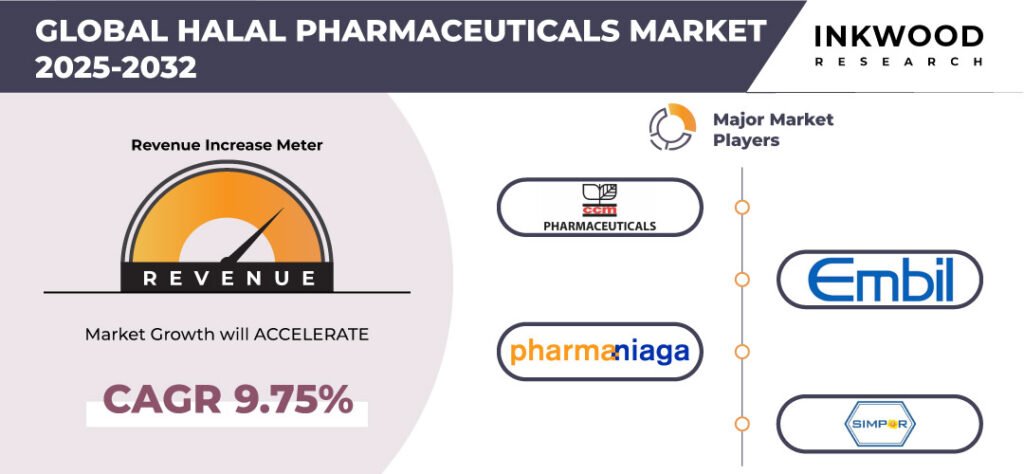
According to Inkwood Research, the global halal pharmaceuticals market is projected to record a CAGR of 9.75% during the forecast period 2025-2032.
The primary purpose of this press release is to highlight emerging trends, showcase leading companies driving innovation, and provide insights into the market’s future potential. As technology and new solutions reshape industries globally, this release aims to inform stakeholders, investors, and enthusiasts about key developments and growth opportunities. It also offers a comprehensive look at the dynamic changes and advancements shaping the future landscape of the market.
Market Overview
Halal pharmaceuticals refer to medications that are formulated and produced in accordance with Islamic law, ensuring that all ingredients and manufacturing processes are compliant with halal standards. These products cater to the growing demand among Muslim consumers for medicines that align with their religious and dietary requirements.
Top 5 Dosage Forms Shaping the Halal Pharmaceuticals Market
The halal pharmaceuticals market is shaped by several key dosage forms leading to innovation and capturing significant market share:
- Syrups: Syrups in the halal pharmaceutical industry are liquid formulations designed for easy consumption, often used to treat conditions like coughs or digestive issues. These syrups are made with halal-certified ingredients, ensuring compliance with Islamic dietary laws.
- Capsules: Capsules in the halal pharmaceutical industry contain active ingredients in a gelatin shell that is made from halal-certified materials. They offer a convenient and precise dosage form while adhering to Islamic dietary guidelines.
- Tablets: Tablets in the halal pharmaceuticals market are solid dosage forms that contain active ingredients and are made using halal-certified excipients. They provide an easy and effective way to deliver medication while ensuring compliance with Islamic law.
- Powders: Powders in the halal pharmaceuticals market are dry, powdered formulations used for various medical treatments, often reconstituted with water. These powders are made from halal-certified ingredients, ensuring they meet Islamic dietary and ethical standards.
- Other Dosage Forms: Other dosage forms in the halal pharmaceutical industry include creams, ointments, and injectables, which are made using halal-certified ingredients. These formulations cater to specific treatment needs while adhering to Islamic dietary and ethical requirements.
Industry Findings & Innovations in the Halal Pharmaceuticals Market
Asia-Pacific Dominates the Market, Led by Malaysia and Indonesia
- The Asia-Pacific dominates the halal pharmaceuticals market, with Malaysia and Indonesia leading the demand for halal-certified medicines. These countries have a large Muslim population and strong regulatory frameworks that support the growth of halal pharmaceutical products.
Growing Focus on Biologics and Biosimilars in Halal Formulations is Expanding
- The growing focus on biologics and biosimilars in halal formulations is driving innovation in the halal pharmaceuticals market. With increasing demand for advanced treatments, companies are developing halal-compliant biologics and biosimilars that offer effective therapeutic options while adhering to Islamic dietary laws.
Increasing Consumer Preference for Ethical and Clean-Label Products
- Increasing consumer preference for ethical and clean-label products is shaping the halal pharmaceuticals market as more individuals seek transparency and integrity in their healthcare choices. This shift is driving demand for halal-certified products made with natural, sustainable ingredients, free from additives or harmful chemicals, aligning with the values of health-conscious and ethically-minded consumers.
Middle East & Africa Halal Pharmaceuticals Market: Regional Analysis & Future Outlook | Impact of Emerging Markets
- The Middle East & Africa halal pharmaceuticals market is experiencing steady growth due to the region’s large Muslim population and rising demand for religiously compliant healthcare products. Governments in countries like Saudi Arabia, UAE, and Egypt are promoting regulations that support the production and sale of halal medicines.
- The market is expanding as consumers increasingly seek pharmaceutical products made from halal-certified ingredients, ensuring ethical sourcing and production. Additionally, rising health awareness and a growing focus on natural and safe treatments are contributing to the popularity of halal pharmaceuticals.
- Local manufacturers and international companies are capitalizing on this trend by offering a wide range of halal-certified medicines across various dosage forms. With a strong cultural and religious emphasis on halal compliance, the region is set to become a significant player in the global halal pharmaceuticals market.
Our comprehensive analysis delves into the latest technological advancements, profiles of leading companies, and forecasts for market expansion. Ideal for stakeholders, investors, and industry professionals alike, our research reports provide actionable insights to navigate this evolving market.
Related Reports:
About Inkwood Research
Inkwood Research is a leading provider of syndicated and custom research reports, as well as expert consulting services. Our comprehensive market intelligence studies are tailored to meet the unique needs of diverse industry verticals, including technology, automotive, chemicals, materials, healthcare, and energy. With a commitment to delivering fact-based insights, we empower businesses to navigate complex market environments and make informed decisions. Our expertise spans extensive geographical coverage, encompassing North and South America, Europe, the Middle East, Asia, Africa, CEE, and CIS regions. At Inkwood Research, we prioritize delivering actionable intelligence that drives strategic growth and innovation for our clients.
For further inquiries, contact us at:
https://www.inkwoodresearch.com
1-(857)293-0150
